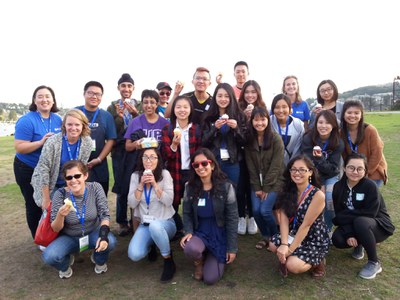University of Washington
This practicum taught me the importance of dealing with ambiguity. I proposed this position to work with two offices at the University of Washington (UW). Different from offices that offer IEM graduate intern position, there were no clear expectations of me from these offices’ end. I have to constantly remind myself of my goals and work towards them without too much supervision or guidance. Managing projects also requires the ability to cope with ambiguity. I was given challenging projects, and I did not necessarily know the answer from the beginning, neither did any other staff in the office know. I must take the initiative and come up with the necessary steps to get to the answer. This process helped me develop ownership of my projects and grow confidence in decision-making.
Considering UW’s decentralized structure, having the opportunity to work with two offices gave me a much more holistic view about the services and resources available to students here. I found this especially beneficial during international student orientation since I received a wide range of student inquiries from immigration check-in, logistics, to cultural transition support at both ISS and FIUTS. Having an idea about both offices’ agenda and responsibilities enabled me to better assist students. I also felt like the staff in both offices could count on me to better understand each other’s situation. I felt like I was really bridging the gap between two offices for a short while.

“Me with FIUTS facilitators.”
Working with two offices also helps me to further explore and understand myself – seeing which office’s work environment and content is a better fit for me. For example, FIUTS has a small but open work space that fosters collaboration and discussion. However, during the time when I needed to focus on my own projects, I got distracted very easily and ended up spending way much more time on my tasks. ISS has a back room for graduate students, yet staying in the room for too long without having direct contact with students was a horrible feeling. Therefore, I discovered about myself that I enjoy wearing multiple hats, having face-to-face time with students, and establishing personal relations with students in multiple aspects. In other words, it is a mixture of both immigration advising and student programming – which will never happen at UW, sadly. Perhaps a smaller school with smaller student population would fit me better.
Of course, there is a downside of working with two offices, too. Splitting my time between two offices hinder my ability to carry out full performance at both. For example, I was given the task to assess the Facilitator’s Program at FIUTS. It is a gigantic program consisting of lots of small components. Due to the limited time I had at FIUTS, I found myself constantly hopping around different parts of the program and could not necessarily find the string that connects them all. As a result, my project deliverables are fragmented. Comparing to the other assessment projects I had done in the past, this one is not as complete as I want. I felt sorry for not being able to show my full work at FIUTS. Also, since FIUTS hires a full-time graduate intern to take the lead on international student orientation, I was not able to take a major coordination or organization role during that event, which was a bit disappointing.
Throughout practicum, I truly realized the importance of getting constructive feedback, whether that is from supervisors or colleagues (staff or GAs). Supervisors offer a lot of insightful feedback because of their years of experience. Getting constant feedback from them prevented me from heading towards the wrong direction at an early stage. Colleagues are great at boosting morale and helping me brainstorm. I once tried to solve all the challenges by myself, but I only ended up sinking deeper and deeper without getting anywhere. Opening it up with colleagues proved to be extremely helpful. They offered their understanding of best practices and helped me gain perspectives. Since then, every time when I got stuck at something, I would look for a second pair of eyes.



You must be logged in to post a comment.